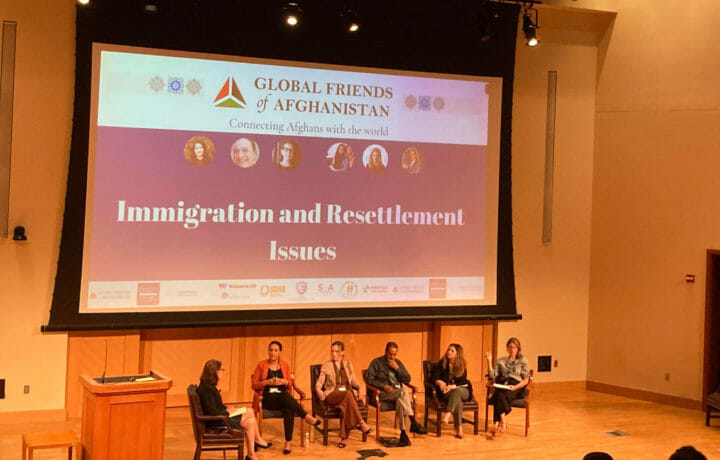Last week Afghans, and allies of Afghans, from around the world gathered in Washington DC to attend the inaugural Global Friends of Afghanistan (GFA) conference. The conference was held by GFA in partnership with the Georgetown Master of Arts in International Business and Policy Programme with the McDonough School of Business and Georgetown’s School of Foreign Service.
The event was a success in many ways. First, the lessons of the August 2021 evacuation were shared and evaluated. Second, many silos were removed in the arena of resettlement of Afghan refugees, and many synergies were created that can speed up the process. Finally, a clear picture of the human rights and humanitarian disasters in Afghanistan was presented. After the morning panels, the participants broke into seven working groups to find solutions to the problems that were presented.
Unfortunately, beyond the 250 participants and a sprinkling of media members, there was little interested among D.C. policymakers in the topic of Afghanistan. No legislative or executive branch members on the invite list attended the conference to learn from the plethora of experts. All of the solutions that were gathered did not instantly reach the desks of the government members who can use them.
A further indicator of the lack of interest in Afghanistan was noted as conference attendees joined in meetings with the government leaders before and after the conference. While some meetings offered slim hope, there was one major theme—”you are on your own.”
What does “on your own” mean to Afghans
Afghans who are outside of their country can count on a variety of non-government organizations to continue to work towards resettlement and integration into their new countries. Afghans can count on the continuing actions of humanitarians and others to keep an eye on Taliban-Haqqani crimes and human rights violations. But the reporting of allies of Afghans and even the UN will have little effect on making Afghans safer. Afghans still in Afghanistan cannot count on any nation intervening in any impactful way to improve the security of the country and protect the human rights of Afghans.
What Can Afghans Do
Afghans are on their own when it comes to making their country safe again for Afghans to live a life with full human rights protections. There are things Afghans can do to speed up the process of the fall of the terrorist regime. Some are simple; none will be easy.
Some Afghans have suggested creating a government-in-exile that can work actively with the UN and other nations to speed aid into the country while working around the terrorist regime. Others have suggested reactivating the ANDSF members still in the country under the government in exile, and then use them to slowly increase security by pushing Taliban-Haqqani fighters out of loosely held areas. Still others are suggesting that the National Resistance Front and other armed groups that are fighting the Taliban-Haqqani regime work to legitimize themselves as political opposition groups with a martial arm. The thinking is, that a shift in their legitimacy might allow some nations to support them politically. With the U.S. stating emphatically they do not support any armed resistance to the Taliban-Haqqani regime, there are few paths for militias to succeed if they cannot become part of a government-in-exile.
Aref Dostyar and Zmarai Farahi recently wrote about how the outside world (especially the U.S.) can change their diplomatic approach to lessen the prestige and leverage of the terrorist regime. Their ideas could be used even more effectively if the various Afghan civil society groups were part of an organized government-in-exile committee system that ensures diplomats are able to engage with as many Afghans as possible while sidelining the terror regime.
Can Afghans Close the Gap?
While there are lots of ideas floating around about how Afghans can organize themselves to counter the current regime, the hardest part might be getting the right Afghans in the room to implement any of the ideas.
One of the most passionate working group discussions at the GFA 2022 conference was the group looking at the future of Afghan governance. The 25 participants came from very different political backgrounds and ancestry. Most had just arrived in the U.S. as refugees from their country. The co-leaders of the exercise were both women. That group session offers a glimpse into how a future Afghan government in exile might be formed. The leaders were able to get the participants to agree on some basic ideas about what the future government must look like and deliver. There was agreement that the Afghan people were tired of kings, warlords, religious fanatics, terrorists, and corrupt all-powerful elected leaders. As one participant put it, we don’t need a signature from the Arg to appoint a high school teacher in Ghor.
The group also agreed that the protection of all human rights for all Afghans was a critical law for the future constitution. They were not convinced that all the ethnic and tribal mandatory positions in government made things any fairer for minorities, and wanted to move towards more merit-based governance. Finally, the group agreed that getting Afghans that think they don’t like each other in a room to talk, was the best remedy for overcoming the disunity that makes creating a better government so challenging. Many Afghans who distrusted each other walked away with a new respect for each other. Whether Afghans can organize themselves on a global scale remains to be seen, but if they fail to provide a better alternative to the current regime, regime collapse likely means another bloody civil war.
*Editorial note, Jason Criss Howk is the director and co-founder of the Global Friends of Afghanistan.




